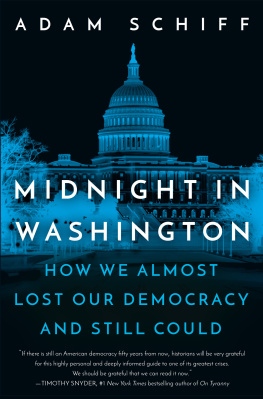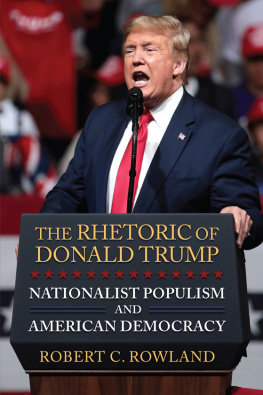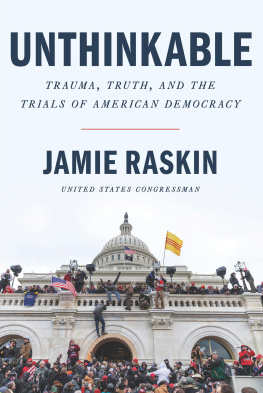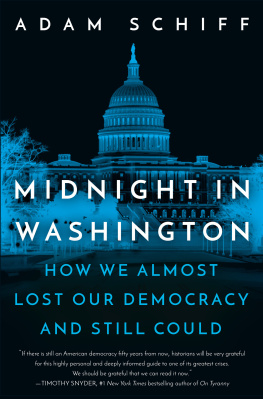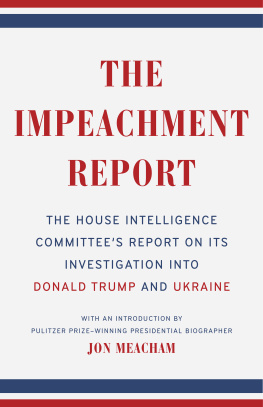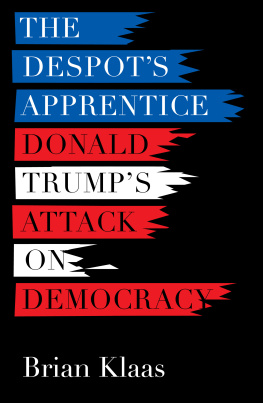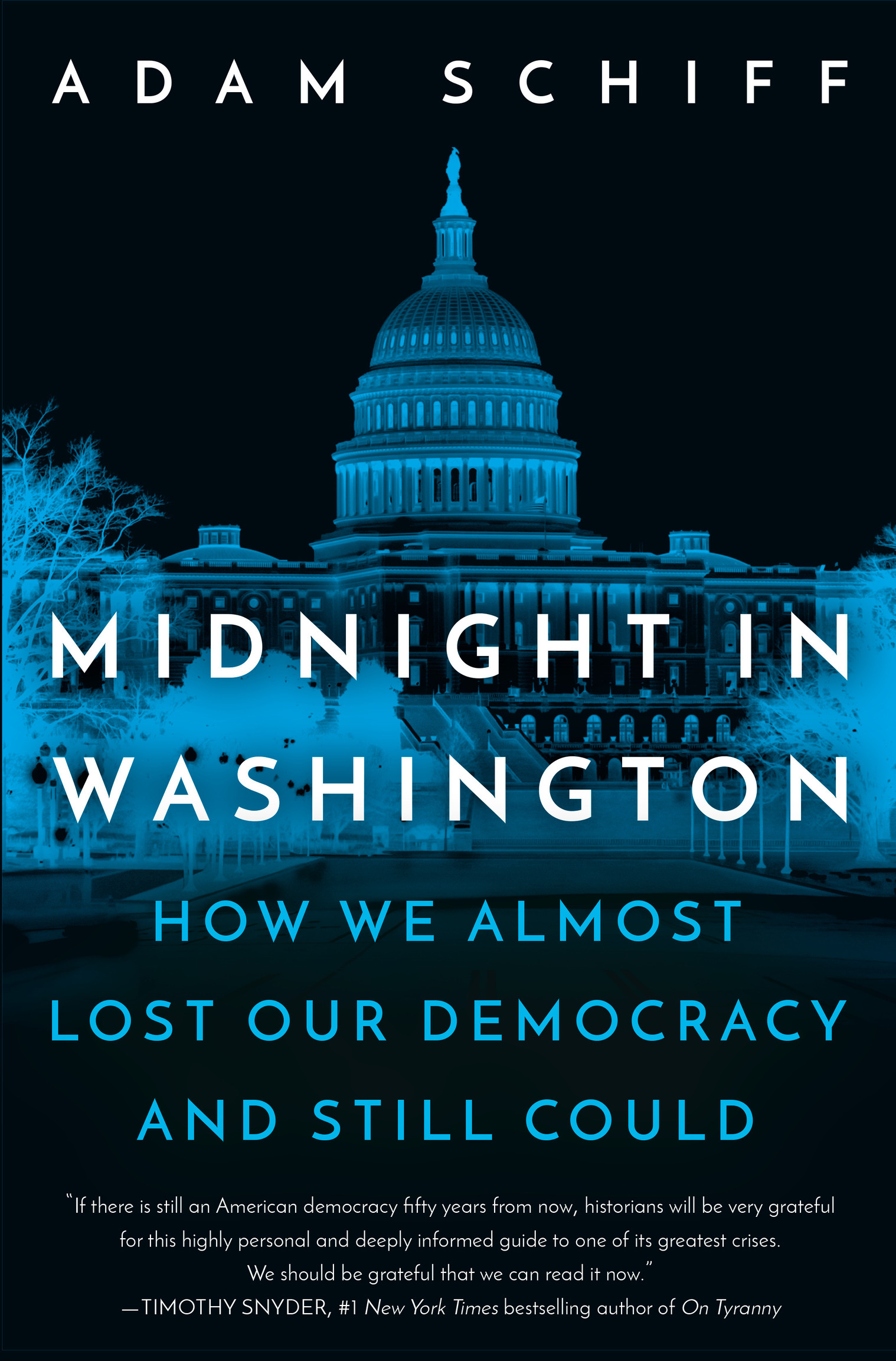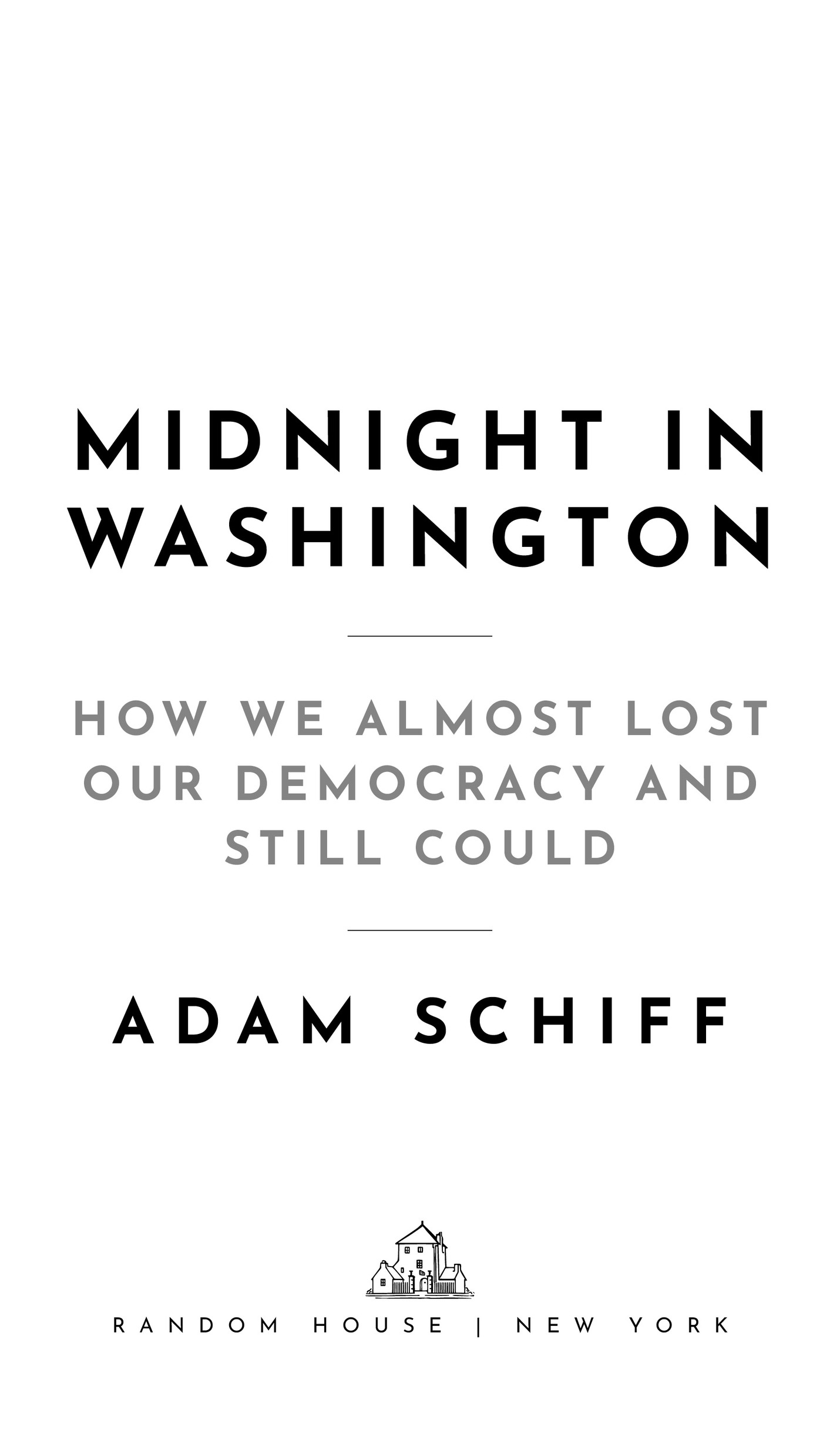All rights reserved.
Published in the United States by Random House, an imprint and division of Penguin Random House LLC, New York.
Random House and the house colophon are registered trademarks of Penguin Random House LLC.
To the end of reckoning.
PROLOGUE
WHY SHOULD I?
The Senate chamber was so much smaller than I remembered. I had tried an impeachment case against a federal judge ten years earlier and hadnt been on the Senate floor since. In the House, I could see members on the other side of the chamber, but only dimly, their faces indistinct in the distance. Some of the Republican members of the House have been there for years, but sit in the far corner and are not on any of my committees, and if I passed them at the airport, I wouldnt know them from a stranger. Indeed, I have passed them at the airport and not known who they were until they stopped and introduced themselves. But as I walked onto the Senate floor again after so long, I couldnt get over how intimate it washow closely I could observe each of the senators and their expressions, faces so familiar to me even if I had never worked with them, or spoken with them, before.
During the trial, with one glance I could tell how closely they were paying attention, or not paying attentionfrowning, thoughtful, drifting off, engaged, moved, angered, or, worse, indifferent. You could see when their eyelids got heavy after lunch or long argumentation, or when their eyes glistened with emotion. We had twenty-four hours, spread out over three days, to make our case for the impeachment of a president, which didnt seem like much, which wasnt much, to sum up all of the reasons why Donald J. Trump posed a continuing danger to the Republic. We had spent two of those days making what I thought was a powerful case, my talented colleagues and incredible staff having put together a series of compelling presentations, integrating the testimony of the witnesses, documentary records, constitutional sources, and all of the powerful argumentation we could musterbut before the last argument of the day, one of my staff put his hand on my arm and stopped me.
They think weve proven him guilty. They need to know why he should be removed.
I didnt have time to ask my staff who they were. We had been getting feedback during the course of the trial, sometimes directly from senators who would walk past us in the small lobby behind the Senate floor, going to and from lunch, or on a break, or who would wander up to our small table on the Senate floor when the days presentations were done. But the best sources of information came from Senator Schumers staff, passed on to my staff in whispers and handwritten notes. Were these questions coming from Democratic senators, like Joe Manchin from West Virginia, Kyrsten Sinema of Arizona, or Doug Jones of Alabama? If so, we were in trouble.
Or was this feedback coming from Republican senators, several of whom had kept their cards close to the vest? If the Republican senators were asking, that meant their minds were still open to conviction, and that was good, even though at this point in the trial they had yet to hear the defense case.
And still, what were they really asking? If senators believed that we had proven Trump guilty of withholding hundreds of millions of dollars of military aid from an ally at war in order to coerce that nation into helping him cheat in the upcoming election, wasnt that enough? Had the bar become so high with this president that that wasnt enough? It was like a juror in an extortion case involving the president asking the judge, Okay, hes guilty, but do we really need to convict? Cant he just go on running the country?
But as I walked to the lectern, I suddenly understood, in a way I hadnt fully appreciated until that moment, that this was the central question: Why should he be removed? He was the president of their party. He was putting conservative judges on the court. He was lowering their taxes. Why remove him? I had watched during breaks in the trial as the presidents Senate defenders took to the airwaves to proclaim his innocence, and I had believed themnot their claims about the presidents conduct, but that they believed what they were saying, that they believed there had been, to quote the presidents mantra of defense, no quid pro quo. But I could see now that that wasnt it at all.
I should have known better. For the past three years, Republicans had confided, to me and to many of my Democratic colleagues, their serious misgivings about the president. Some would go on Fox News and bash me, only to urge me privately to keep on with the investigation. And it became clear that many Republicans felt someone needed to do it, someone needed to put a stop to it all, even if they couldnt, or wouldnt. And the question wasnt so much Why should he be removed? as Why should I be the one to remove him? Why should I risk my seat, my position of power and influence, my career and future? Why should I? Why should I?
There was only half an hour left of our case that day when I pulled my thoughts free of my staff to make those seven short paces from the House managers table to the lectern, and I had no idea how I was going to answer that question. I had prepared to go through the record of the presidents call again, the one in which he says I want you to do us a favor, thoughbecause I had discovered there was so much more to that transcript, so much more now that we understood the whole scheme, and I had planned to go through it, line by line. It had become a practice of mine, during the hearings in the House, to do a kind of impromptu summary at the end of each proceeding, to try to distill the importance of what we had heard or learned, to try to express simply the significance of something that had struck me as particularly powerful or telling. It didnt even have to be all that important in its own right, as long as it spoke to something larger, something that shed light on the bigger issue, on what was at stake. But the call record now seemed insignificant, compared to the question: Why should I?
I needed time to think, and so I did go through the call record with the senators, pulling out a line here or there to explain its new significance. Most of the senators were listening politely after a long day, but not all, and their concentration was wandering, and so was mine. I was doing a kind of extreme multitasking, reading and speaking about the call but thinking about the question I needed to answer, and all the other questions that it presumed: What made this man so dangerous? What had he done to the country? How, in three short years, had he been able to so completely remake his own party, get it to abandon its own ideology, get my friends and colleagues to surrender themselves to his obvious immorality? How had he caused us to question ourselves, our values, our commitment to democracy, what the country even stood for? How had he been able to convince so many of our fellow citizens that his views were the truth, and that they should believe him no matter how obvious the lies?

